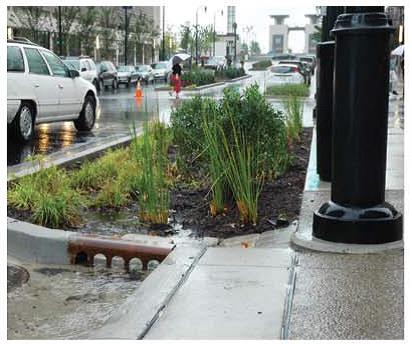Green Infrastructure

Green Infrastructure (GI) is more than just the laundry list of sustainable applications, like green roofs, bigger tree planters, and frequent curb cuts. It’s also about conservation, citizen engagement, and the economics of having a livable community. It serves as both a proactive and reactive measure to ensure the environmental health of a community.
With all its social, environmental, and economic benefits, why has it been so slow to catch on in southern urban areas? Much of it has to do with the culture of municipal engineering departments, which are often quick to say no to “new” ideas. Graduating engineers and landscape architects don’t view GI as something new and different, or even very innovative – it’s just how streetscape design is being taught.
But until these emerging P.E’s and L.A.’s are managing local design projects, what can be done in the meantime to move the needle? Athens-Clarke County, GA, and Nashville, TN seem to have figured it out. What follows are some ideas to borrow, whether you hold the carrot or the stick in your communities.
1.) Be reactive: respond to climate change effects with some guidelines. In response to severe flooding and with a little help from some increased State water quality regulation, Nashville developed a plan to design, fund, and implement GI. Now, other cities take their engineers to see how it can in fact be done, in spite of clay soils, karst, seasonal detritus, and all the other reasons the south “can’t” pull it off. It’s a report that speaks to both the benefits and drawbacks of each GI practice, making it less like an advocate publication and more like a how-to manual.
2.) Be pro-active: create a green space / riparian acquisition program. Often city administrators don’t have the luxury of thinking much about the future, so it’s easy to get stuck in a reactive cycle. We all know that being pro-active is actually much more efficient and cost effective in the long run. Citizens can serve as a key conservation catalyst, as they did in Athens- Clarke County. They mobilized and worked with council and the administration to fund the purchase of undeveloped local areas to improve overall quality of life and community health.
3.) Be affirmative: everyone loves positive press. Each year, the Athens-Clarke County Stormwater Management Program presents the Stormwater Steward Award to an organization, business, individual, or community group that has gone above and beyond to reduce the impact of stormwater runoff on our waters through a specific project, practice, or event. Think of it as a Green Business program for high rollers.
Bottom Line
You don’t have to be stuck baking your engineers cookies and pleading with them to incorporate GI into your streetscapes. You can go to the private sector. You can go to the community organizers. You can lead on the experience of regional peer cities and counties who are done with the why and on to the how.